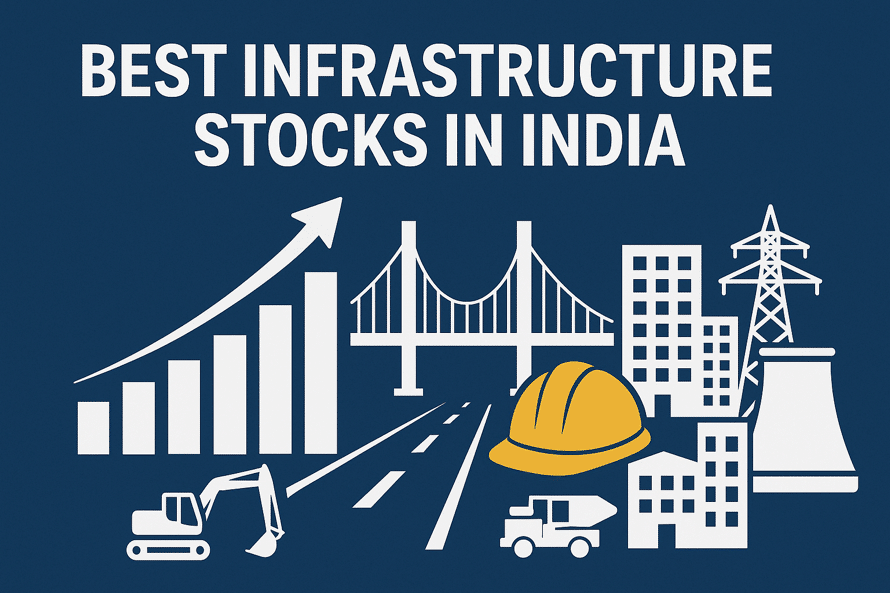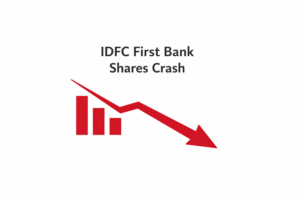Best Infrastructure Stocks in India

Infrastructure stocks are, in a sense, the foundation of a country’s economic development. With government support, the demand for infrastructure development in India is increasing.
Investors can profit from the growing potential of the infrastructure sector, but it’s essential to understand the complexities involved. This article will discuss infrastructure stocks, including how to invest in them, their associated risks, and other relevant considerations.
Introduction to Infrastructure Stocks
Infrastructure stocks are investments in companies that build and run essential public infrastructure. Investors like these firms because they have consistent demand, government support, and the potential for long-term expansion, driven by urbanization and economic growth.
What are infrastructure stocks?
Infrastructure stocks comprise the shares of companies that build, own, and manage a country’s vital physical infrastructure. They include roads, bridges, railways, power generation plants, seaports, airports, telecommunications systems, and utilities. These firms sign long-term contracts and secure government funds, making their cash flows more stable and certain. Compared to other industries, investors perceive them as relatively stable.
Why invest in infrastructure stocks?
Infrastructure firms thrive when there is steady demand, which the government typically helps to sustain. Additionally, large projects make it difficult for new companies to enter, which reduces competition. Businesses that build assets generate a steady stream of income. Infrastructure stocks are suitable for a range of investors, as they offer both income and growth opportunities.
Why the Infrastructure Sector is Important for India’s Growth
Infrastructure acts as the fundamental backbone of a growing economy. Its growth boosts productivity, fosters better connections, and enhances the overall quality of life. A strong infrastructure sector in India also supports the country’s long-term development objectives. It promotes sustainable growth and attracts significant investments.
How does infrastructure impact the economy?
Strong infrastructure reduces corporate expenses by enhancing logistics and connections. Efficient highways and ports facilitate the efficient movement of goods, cutting costs and delays. Reliable electrical grids and digital networks help industry and services.
Government efforts such as the National Infrastructure Pipeline, Bharatmala, and Sagarmala are driving progress forward. Between 2020 and 2025, over 100 trillion Indian rupees were projected to be spent in the National Infrastructure Pipeline (NIP).
What makes infrastructure stocks attractive to investors?
Infrastructure stocks usually enjoy stable, long-term income streams from contracts with governments or large corporations. The sector usually faces limited competition because projects require significant capital investment. Investors gain exposure to structural growth, particularly in emerging markets such as India, where urbanization and economic development drive large-scale construction efforts.
Top Infrastructure Stocks in India to Watch in 2025 by Market Cap
Now, let’s examine some of India’s leading infrastructure stocks. These companies are notable choices for investment in the rapidly expanding and government-backed infrastructure development sector. Besides, their strong market presence, reliable performance, and potential for future growth make them appealing options.
List of best infrastructure stocks with brief descriptions
Infrastructure stocks drive economic growth by constructing roads, railways, and power plants. L&T and IRB are arguably the best in the business, offering excellent long-term investment options.
Larsen & Toubro Ltd
Larsen & Toubro plays a crucial role in developing India’s infrastructure. It has a market capitalization of Rs 4,78,811 crore. The company is one of the largest engineering and construction firms in the country.
L&T operates in various sectors, including construction, power, heavy engineering, and IT. The company’s extensive market presence indicates that it collaborates with a wide range of enterprises and is a significant player in national infrastructure projects.
Rail Vikas Nigam Ltd
Rail Vikas Nigam Ltd (RVNL) plays a significant role in India’s infrastructure sector, concentrating on railway development. The company has a market capitalization of Rs 78,126 crore and actively manages key projects.
They include track laying, electrification, and station redevelopment. RVNL is geared for long-term development as India improves its railway infrastructure. The company has significant government backing and a promising project pipeline.
IRB Infrastructure Developers Ltd
IRB Infrastructure Developers Ltd, with a market capitalization of Rs 29,150 Cr, stands out as a leading infrastructure firm that focuses on toll roads, highways, and transportation projects. The company holds a prominent position in the Indian road infrastructure industry.
It actively participates in several nationwide projects aimed at enhancing connections and reducing travel times. The strong project pipeline and strategic relationships with the government create favorable long-term development prospects.
KEC International Ltd
KEC International Ltd is a global corporation that builds infrastructure and does engineering work. With the market capitalization of Rs 23,324 crore, it works on creating infrastructure, expanding railroads, and transmitting power.
KEC’s excellent market position is also due to its wide range of projects. Its focus on sustainable energy and transportation infrastructure makes it even more likely to grow. The company is well-positioned to capitalize on the growing demand for new infrastructure in both local and global markets.
Kalpataru Projects International Ltd
In the infrastructure industry, Kalpataru Projects International Ltd is a leading player. With a market capitalization of Rs 20,374 Cr, the company focuses on construction and engineering projects in the power, oil & gas, and transportation sectors.
Kalpataru holds a strong market position due to its expertise in large-scale projects. The company supports its steady growth with a diverse portfolio, a robust order book, and the ability to capitalise on new infrastructure opportunities nationwide.
Key factors that make these stocks strong performers
Infrastructure firms are solid investments as they typically have long-term contracts, a strong pipeline of orders, and stable cash flows. Investors are more likely to trust the long-term performance of the industry if the companies have experienced management, complete projects on schedule, and work toward national development goals.
How to Evaluate Infrastructure Stocks?
When selecting infrastructure stocks, do your research diligently. Additionally, investors consider a company’s financial health, order book strength, capacity to fulfill orders, and its compliance with government regulations before investing.
What financial metrics should you check?
When evaluating infrastructure companies, investors examine key financial metrics to assess a firm’s stability, profitability, and long-term prospects.
- Debt-to-equity ratio: The capital-intensive nature of projects necessitates a company maintaining manageable leverage. Generally, lower ratios are preferable.
- Earnings growth and profitability: Examine EBITDA margins, assess the return on capital employed (ROCE), and analyze trends in net profit.
- Order-book strength and revenue visibility: A substantial, diverse, and government-linked order backlog offers you a clear picture of your company for years to come.
- Cash flow stability: A firm is performing well and is in an excellent financial position if its operational cash flows remain stable.
How do government policies affect these stocks?
Public capital investment and clear policy have a significant impact on returns. Smart Cities, Bharatmala, and renewable energy subsidies drive the project pipeline. Success requires political stability and clear rules. Otherwise, policies or projects might change or face delays.
Risks and Challenges in Investing in Infrastructure Stocks
Infrastructure stocks present significant growth opportunities, but investors should carefully consider several risks and challenges that may impact returns, including regulatory delays, high levels of debt, and execution uncertainties.
Common risks to be aware of
Infrastructure investments are prone to several risks, including project delays, cost overruns, regulatory obstacles, and financial instability, all of which can impact returns.
- Execution delays and cost overruns: Land acquisition challenges, regulatory issues, and execution inefficiencies frequently lead to project setbacks.
- Policy and political risk: A change in government or priorities may impact funding commitments and alter project viability.
- Debt stress: Mismanagement of leverage strains balance sheets when revenues fall short of expectations.
- Environmental and social risks: Violations of environmental laws or opposition from the community might slow down infrastructure projects.
How to manage risks while investing?
Manage risks effectively by diversifying, analyzing financials, monitoring government policies, and selecting infrastructure stocks with strong execution and low debt.
- Diversify your investment across sub-sectors, such as roads, power, and urban works, to mitigate risk.
- Look at strong balance sheets that have reasonable debt-equity ratios and cash buffers that are sufficient.
- Choose firms that consistently execute well and maintain partnerships with the government.
- Track macro trends—expansion of capex in budgets, reforms like PPP models, and growth in the municipal bond market all suggest opportunities.
Tips for Investing in Infrastructure Stocks
Investors must decide whether to invest directly or utilize mutual funds to navigate the infrastructure segment successfully, and they need to select an appropriate time horizon to maximize returns in this rapidly evolving space.
Should you invest directly or through mutual funds?
Direct stock ownership provides good exposure, potential outperformance, and greater control, but requires thorough research and ongoing attention. Infrastructure mutual funds and ETFs, especially those with a thematic focus, provide diversity, expert management, and simplicity.
Additionally, selecting direct mutual fund plans helps you save on commissions and enhances long-term returns. On the other hand, regular plans or ETFs offer valuable advisory support, making them a better choice for beginners or those who lack the time to monitor the markets.
Long‑term vs. short‑term investment approach
The strategy must match the timeline. Five-year plans unlock compounding, infrastructure cycles, and policy-driven development. Focusing on budget releases or project victories yields quick dividends, but it also raises volatility and scrutiny. For the patient and long-term thinker, infrastructure investment pays good returns.
Conclusion
Government support and economic growth have created steadier and more valuable infrastructure stocks. Concentrate on financially sound companies, diversify your portfolio across multiple sectors, and keep an eye on the macroeconomic situation to prevent any disruptions and be up-to-date with the changes in the regulations.
FAQs
Q. Which are the best infrastructure stocks in India right now?
L&T, IRB Infrastructure, and RVNL are arguably some of the best infrastructure stocks. They have robust pipelines and sound financials.
Q. Are infrastructure stocks good for long-term investment?
Yes. Long-term contracts, predictable financial flows, and urbanization, along with policy-driven structural demand, benefit them.
Q. How does government infrastructure spending impact these stocks?
Capex volumes significantly impact infrastructure stocks. Besides, government financing and policy changes drive infrastructure projects, which in turn improve stock performance.
Q. What are the risks of investing in infrastructure companies?
Risks include projects taking longer than planned, exceeding budget, and accumulating excessive debt, encountering environmental issues, and changes in legislation.
Q. Can beginners invest in infrastructure stocks easily?
New investors should start with thematic mutual funds or ETFs to gain diversified exposure. Consider direct stock investing only after conducting thorough research and focusing on a company’s financial health, experience, and track record.
Disclaimer
The stocks mentioned in this article are not recommendations. Please conduct your own research and due diligence before investing. Investment in securities market are subject to market risks, read all the related documents carefully before investing. Please read the Risk Disclosure documents carefully before investing in Equity Shares, Derivatives, Mutual fund, and/or other instruments traded on the Stock Exchanges. As investments are subject to market risks and price fluctuation risk, there is no assurance or guarantee that the investment objectives shall be achieved. Lemonn do not guarantee any assured returns on any investments. Past performance of securities/instruments is not indicative of their future performance.
To read the RA disclaimer
Research Analyst - Gaurav Garg







